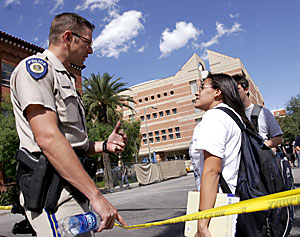 |
|
EVAN CARAVELLI/Arizona Daily Wildcat
|
A Tucson Police Department Bomb Squad officer throws debris into the charred remains of a van behind the Physics and Atmospheric Sciences building yesterday afternoon. The van was torn apart by two pounds of high explosives as part of a simulated terrorist attack that was designed to test the readiness of local first responders.
|
|
|
By Holly Wells
Arizona Daily Wildcat
Tuesday, October 12, 2004
Print this
At 8:06 a.m. yesterday campus was thrown into a state of emergency with fire alarms sounding, fire trucks lining the street and bodies strewn on the ground. The chaos was all part of a 4-hour-long disaster drill to help better prepare emergency workers for real emergencies.
The drill involved a hypothetical situation, treated like a real emergency, in which a van with a bomb in it exploded next to the Physics and Atmospheric Sciences building on East Fourth Street, and resulted in several casualties and fear that the building would collapse.
East Fourth Street was blocked off from North Park Ave to East Highland Avenue. Portions of North Highland Avenue were also partially blocked off.
The Physics and Atmospheric Sciences, Biological Sciences East, Microbiology and Veterinary Sciences, Marley, Shantz, Math, Social Sciences, Gould-Simpson, and Family and Consumer Sciences buildings were all evacuated during the drill along with the ROTC and Yavapai Halls. Most classes were canceled in these buildings.
Sgt. Eugene Mejia, UAPD spokesman, briefed reporters around 9:25 a.m. about the emergency.
"We got an explosion call at 8:06 a.m. with multiple victims on site," Mejia said.
Mejia said a unified command post had been formed with Tucson Fire Department, Tucson Police Department, and UAPD. Mejia said FBI officers, Alcohol, Tobacco, and Firearms officers and explosive detection canines were on the scene.
"There have been multiple casualties and we're trying to notify the next of kin as soon as possible," Mejia said, "We are still trying to determine the suspects."
The drill was meant to be as realistic as possible with hardly anyone on campus knowing about the drill ahead of time and officers not admitting it was a drill until it was over.
Some students stood behind yellow caution tape, looking at the bodies on the sidewalk and wondering what was going on.
Kathy Badria, an undeclared junior, said she was shocked when she saw the chaos and did not realize it was just a drill.
"There was this girl laying on the ground and I was very worried, I was going to cry, it was just a reflex," she said.
Badria said she thought it was good officers were doing the drill.
"It puts it in a realistic situation and helps them prepare for when something really does happen," Badria said.
Filemon Zamora, who teaches Spanish 103 in the PAS building, said he came to class prepared to give a quiz only to find that he couldn't enter the building.
Zamora said he had come from the Social Sciences building where the fire alarm had gone off.
 |
|
EVAN CARAVELLI/Arizona Daily Wildcat
|
UAPD Officer Chris Scheopner directs veterinary science senior Teresa Drury away from the scene of yesterday's simulated terrorist attack. Many students and faculty were turned away from buildings that had been evacuated as part of the four-hour drill.
|
|
|
"I came and they said, 'You can't go into the building, can't you see there's something going on?' I thought it was real," he said.
Melissa Cota, a pre-business freshman who is in Zamora's class, said she thought it was good that emergency workers did not tell people about the drill in advance.
"My brother is a paramedic and I know he likes the drills; it gets him prepared," Cota said.
Bodies of both student volunteers and dummies were laid out along East Fourth Street, some being carried off in stretchers.
Mejia said the blast had come from the van and it was unknown whether the driver had left or been caught in the explosion.
Police patrolled the area in gas masks, and when two police officers approached a backpack in the road, a facilitator told them a bomb had gone off and they were dead because they had not properly secured the area. The officers had to lie on the street and pretend they were dead for the remainder of the drill.
Other students walked right though the drill, seemingly unconcerned with the fire trucks and ambulances.
Some students who walked through were told they were now victims, and the students stayed until they were replaced with volunteer victims.
Mejia said the UA tries to do an emergency preparedness drill once a year. This is the second year the drill has taken place.
The departments involved assumed the cost of the drill, including UAPD, TPD, Tucson Fire Department, the FBI and Alcohol, Tobacco and Firearms, Mejia said.
"In an actual scenario we would get some refunds from the government," he said.
In a press conference after the drill, UAPD Commander Brian Seastone said the drill was "absolutely" a success.
"That's what these drills are about," Seastone said. "To be better prepared at what we do."
Preparedness will also help minimize injury and cost in the event of a real emergency, said Saundra Taylor, senior vice president of Campus Life.
"When the real thing happens, this kind of thing will help us be prepared," Taylor said.
Last year, a media release was sent out a few days before the drill took place; this year there was no media release issued.
